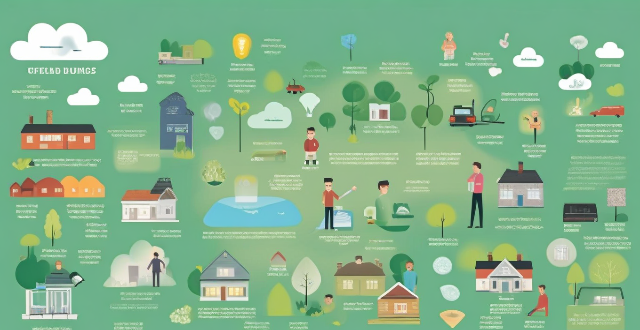The article discusses the social implications of environmental degradation, including health impacts such as air pollution and water pollution, economic impacts such as loss of biodiversity and job losses, social impacts such as displacement and cultural loss, and political impacts such as conflicts and refugees. It emphasizes the need for collective action to address these challenges and protect the natural environment for future generations.

The Social Implications of Environmental Degradation
Environmental degradation refers to the deterioration of the natural environment, including air, water, and land. It is caused by various human activities such as industrialization, urbanization, deforestation, and pollution. The social implications of environmental degradation are far-reaching and affect various aspects of human life. In this article, we will discuss some of the most significant social implications of environmental degradation.
Health Impacts
1. Air Pollution: Air pollution is a major cause of respiratory diseases such as asthma, bronchitis, and lung cancer. It also contributes to cardiovascular diseases and premature death.
2. Water Pollution: Contaminated water sources can lead to waterborne diseases such as cholera, dysentery, and typhoid fever. It can also cause skin infections, eye infections, and other health problems.
3. Food Security: Environmental degradation can lead to reduced crop yields and food insecurity, which can result in malnutrition and hunger.
Economic Impacts
1. Loss of Biodiversity: The loss of biodiversity due to environmental degradation can have significant economic impacts on industries that rely on natural resources, such as agriculture, fishing, and tourism.
2. Job Losses: Environmental degradation can lead to job losses in industries that rely on natural resources, such as mining and logging. This can have a ripple effect on local economies and communities.
3. Increased Costs: Environmental degradation can lead to increased costs for businesses and governments in terms of healthcare, infrastructure repairs, and disaster response.
Social Impacts
1. Displacement: Environmental degradation can lead to displacement of communities due to natural disasters or loss of livelihoods. This can result in social tensions and conflicts over resources.
2. Cultural Loss: Environmental degradation can lead to the loss of cultural heritage sites and traditional knowledge about the environment. This can have negative impacts on indigenous communities and their way of life.
3. Education: Environmental degradation can impact access to education by reducing funding for schools and creating health issues that prevent children from attending school regularly.
Political Impacts
1. Conflicts: Environmental degradation can lead to conflicts over resources between different groups or countries. This can result in political instability and even war.
2. Refugees: Environmental degradation can create climate refugees who are forced to leave their homes due to natural disasters or loss of livelihoods. This can strain international relations and create political tensions.
3. Policy Changes: Environmental degradation can lead to policy changes at both national and international levels, as governments seek to address the root causes of environmental degradation and its social implications.
In conclusion, environmental degradation has far-reaching social implications that affect various aspects of human life, including health, economy, society, and politics. Addressing these challenges requires a collective effort from individuals, communities, governments, and international organizations to adopt sustainable practices and protect our natural environment for future generations.